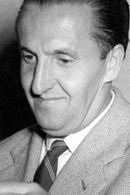Luigi Zampa's educational background took a dramatic turn when he abandoned his earlier pursuits in architecture and engineering to pursue a new passion for screenwriting and directing at the prestigious Centro Sperimentale di Cinematografia in Rome, a journey that spanned from 1932 to 1937.
During World War II, Zampa's skills were put to the ultimate test as he produced military training films for the Italian army, while also collaborating on film scripts. His experience in the war had a profound impact on his subsequent work, particularly his directorial debut in 1941, which initially focused on lighthearted romantic comedies, but gradually shifted towards more serious and thought-provoking themes.
One of his most acclaimed films, To Live in Peace (1947),was a powerful anti-war statement that showcased his growing maturity as a filmmaker. This was followed by Anni difficili (1948),a critically acclaimed film that examined the tumultuous period in Italy's recent history, from the Nazi occupation to the subsequent Allied influence.
As one of the pioneers of Italian neorealism, Zampa infused his films with satire and political commentary, shedding light on the corrupt and bourgeois aspects of society. However, his post-1960 films took a more commercial and escapist turn, catering to a broader audience.





















